Business and Commercial Law - Problem Questions - Semester 2
VerifiedAdded on 2023/04/07
|9
|2199
|428
Homework Assignment
AI Summary
This assignment addresses two problem questions in business and commercial law. The first question examines the breach of a restraint of trade clause by an ex-employee who established a competing company. It explores the application of the corporate veil doctrine and the potential for piercing the veil to hold the individual liable. The second question delves into partnership law, assessing the rights and liabilities of partners in relation to various contracts entered into by individual partners. It analyzes issues of agency, fiduciary duty, and the scope of a partner's authority, referencing relevant legislation and case law, including the Partnership Act 1892 (NSW) and cases such as Gilford Motor Co Ltd v Horne and Birtchnell v Equity Trustee, Executors & Agency Co Ltd.
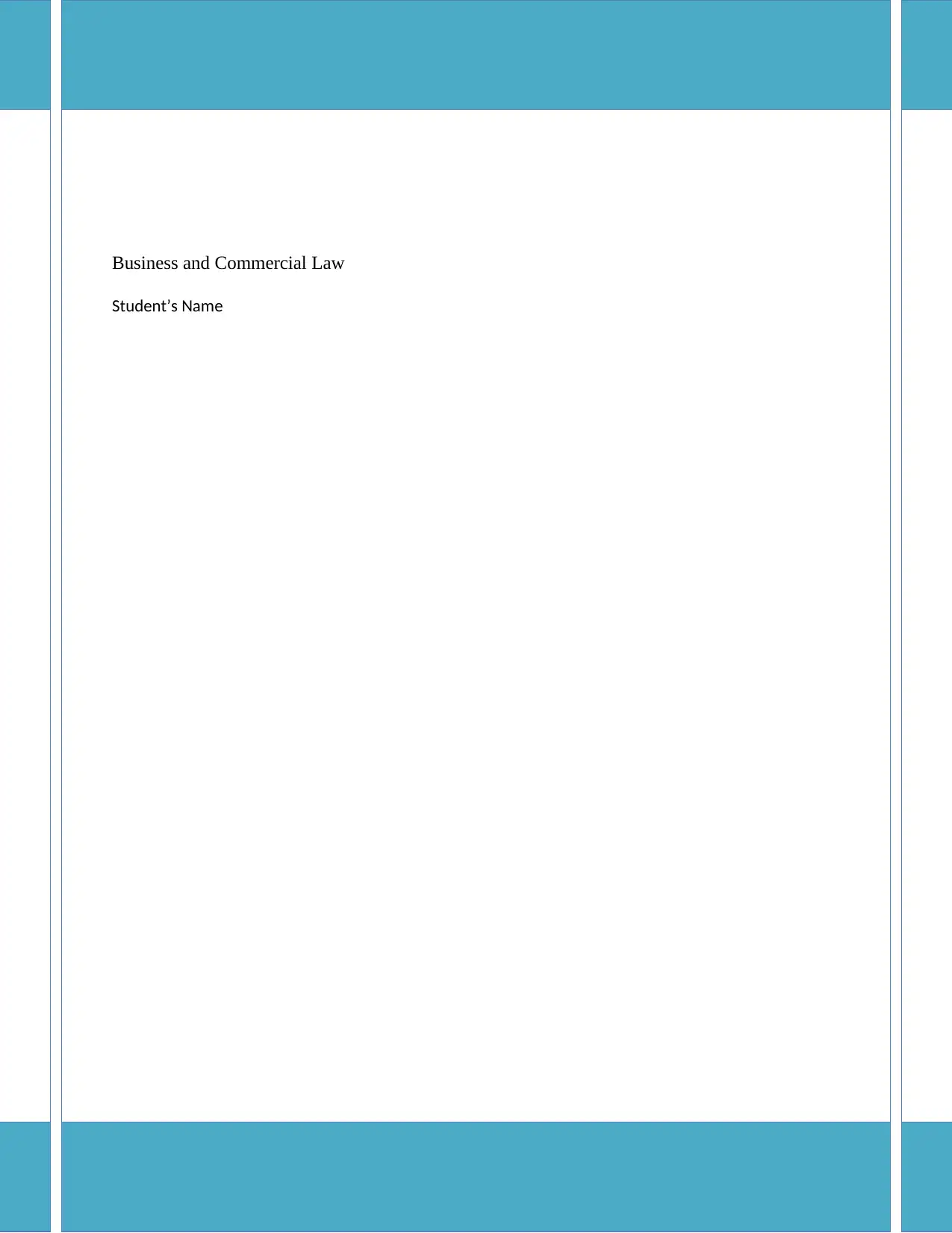
Running Head: Business and Commercial Law
0
Business and Commercial Law
Student’s Name
0
Business and Commercial Law
Student’s Name
Paraphrase This Document
Need a fresh take? Get an instant paraphrase of this document with our AI Paraphraser
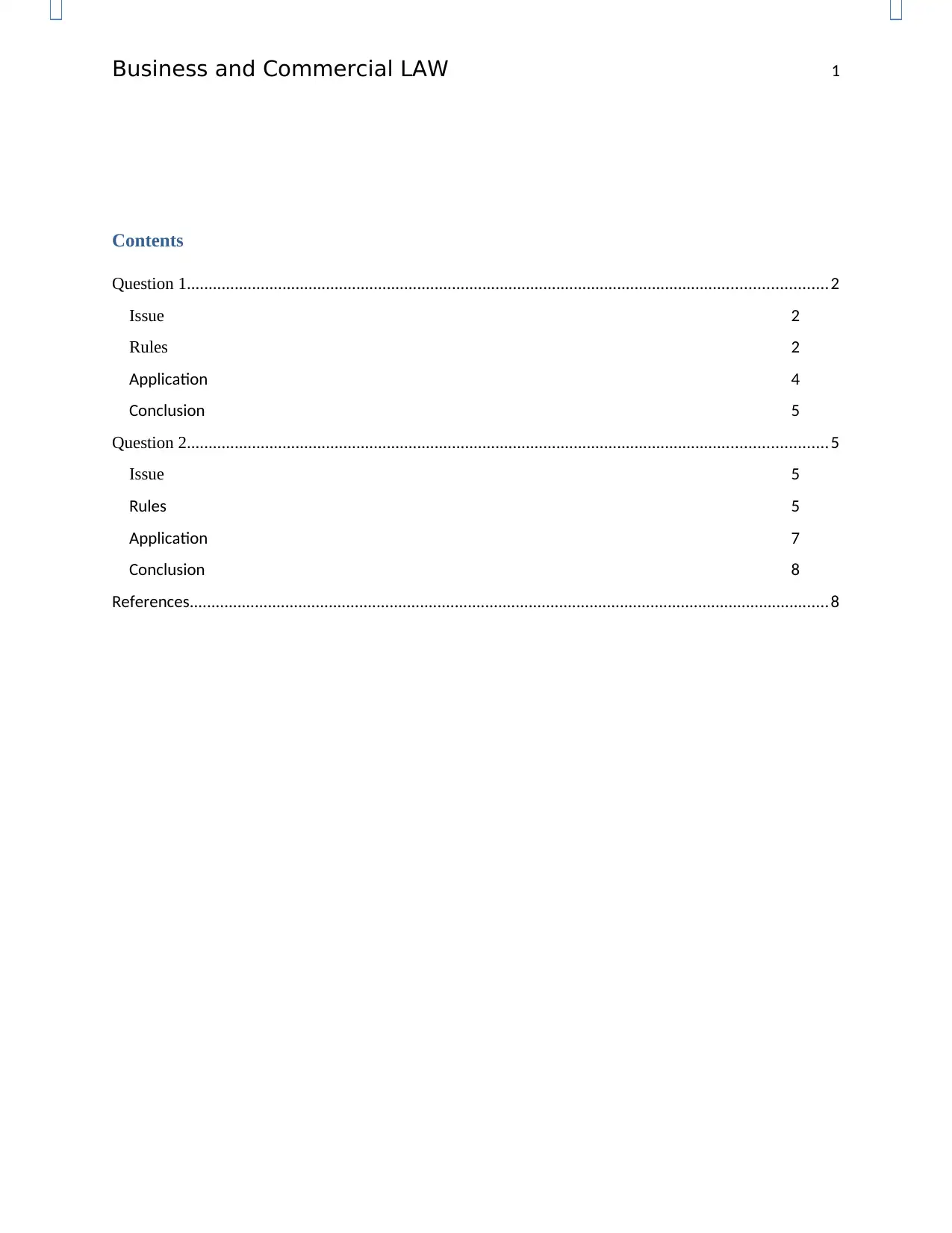
Business and Commercial LAW 1
Contents
Question 1...................................................................................................................................................2
Issue 2
Rules 2
Application 4
Conclusion 5
Question 2...................................................................................................................................................5
Issue 5
Rules 5
Application 7
Conclusion 8
References...................................................................................................................................................8
Contents
Question 1...................................................................................................................................................2
Issue 2
Rules 2
Application 4
Conclusion 5
Question 2...................................................................................................................................................5
Issue 5
Rules 5
Application 7
Conclusion 8
References...................................................................................................................................................8
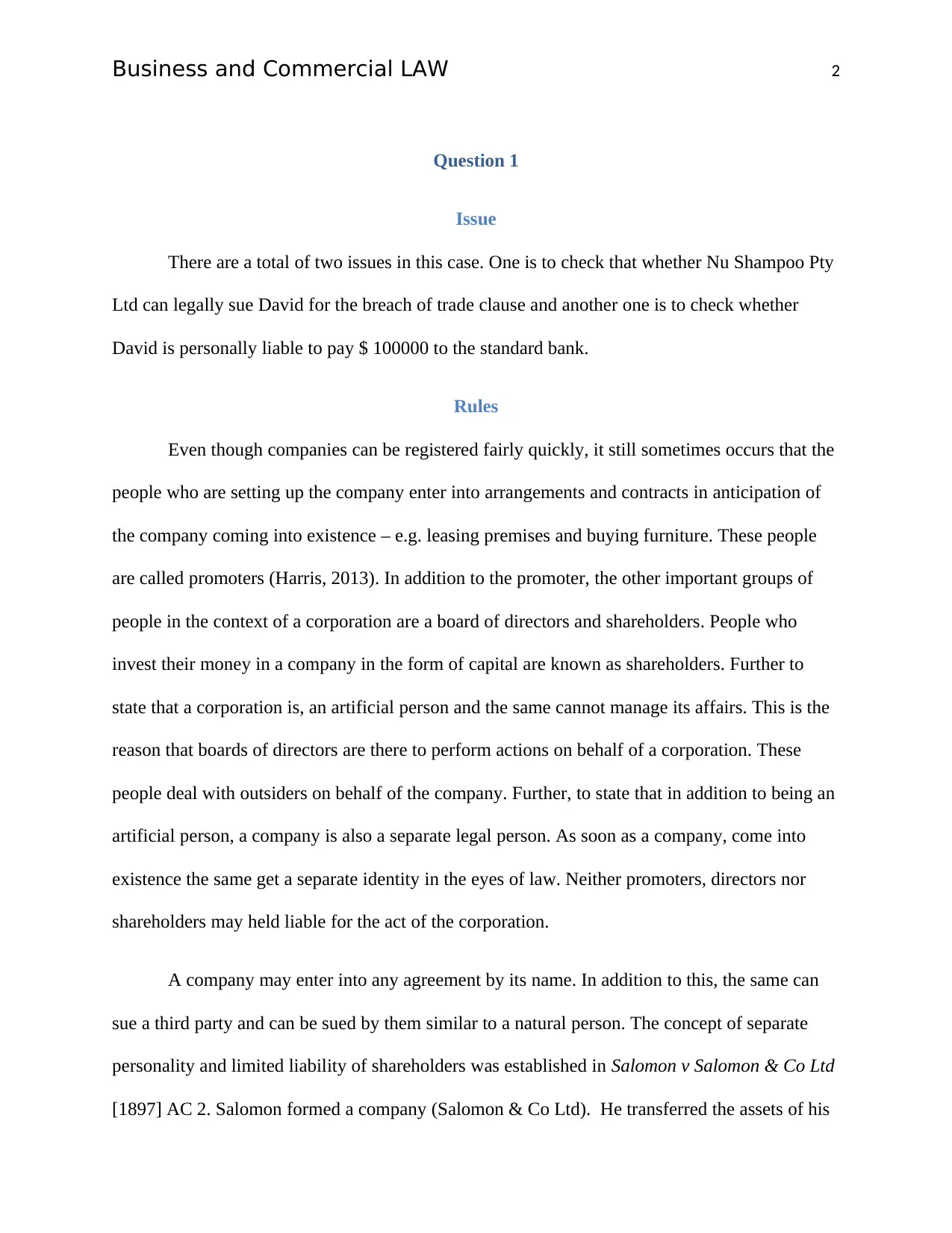
Business and Commercial LAW 2
Question 1
Issue
There are a total of two issues in this case. One is to check that whether Nu Shampoo Pty
Ltd can legally sue David for the breach of trade clause and another one is to check whether
David is personally liable to pay $ 100000 to the standard bank.
Rules
Even though companies can be registered fairly quickly, it still sometimes occurs that the
people who are setting up the company enter into arrangements and contracts in anticipation of
the company coming into existence – e.g. leasing premises and buying furniture. These people
are called promoters (Harris, 2013). In addition to the promoter, the other important groups of
people in the context of a corporation are a board of directors and shareholders. People who
invest their money in a company in the form of capital are known as shareholders. Further to
state that a corporation is, an artificial person and the same cannot manage its affairs. This is the
reason that boards of directors are there to perform actions on behalf of a corporation. These
people deal with outsiders on behalf of the company. Further, to state that in addition to being an
artificial person, a company is also a separate legal person. As soon as a company, come into
existence the same get a separate identity in the eyes of law. Neither promoters, directors nor
shareholders may held liable for the act of the corporation.
A company may enter into any agreement by its name. In addition to this, the same can
sue a third party and can be sued by them similar to a natural person. The concept of separate
personality and limited liability of shareholders was established in Salomon v Salomon & Co Ltd
[1897] AC 2. Salomon formed a company (Salomon & Co Ltd). He transferred the assets of his
Question 1
Issue
There are a total of two issues in this case. One is to check that whether Nu Shampoo Pty
Ltd can legally sue David for the breach of trade clause and another one is to check whether
David is personally liable to pay $ 100000 to the standard bank.
Rules
Even though companies can be registered fairly quickly, it still sometimes occurs that the
people who are setting up the company enter into arrangements and contracts in anticipation of
the company coming into existence – e.g. leasing premises and buying furniture. These people
are called promoters (Harris, 2013). In addition to the promoter, the other important groups of
people in the context of a corporation are a board of directors and shareholders. People who
invest their money in a company in the form of capital are known as shareholders. Further to
state that a corporation is, an artificial person and the same cannot manage its affairs. This is the
reason that boards of directors are there to perform actions on behalf of a corporation. These
people deal with outsiders on behalf of the company. Further, to state that in addition to being an
artificial person, a company is also a separate legal person. As soon as a company, come into
existence the same get a separate identity in the eyes of law. Neither promoters, directors nor
shareholders may held liable for the act of the corporation.
A company may enter into any agreement by its name. In addition to this, the same can
sue a third party and can be sued by them similar to a natural person. The concept of separate
personality and limited liability of shareholders was established in Salomon v Salomon & Co Ltd
[1897] AC 2. Salomon formed a company (Salomon & Co Ltd). He transferred the assets of his
⊘ This is a preview!⊘
Do you want full access?
Subscribe today to unlock all pages.

Trusted by 1+ million students worldwide
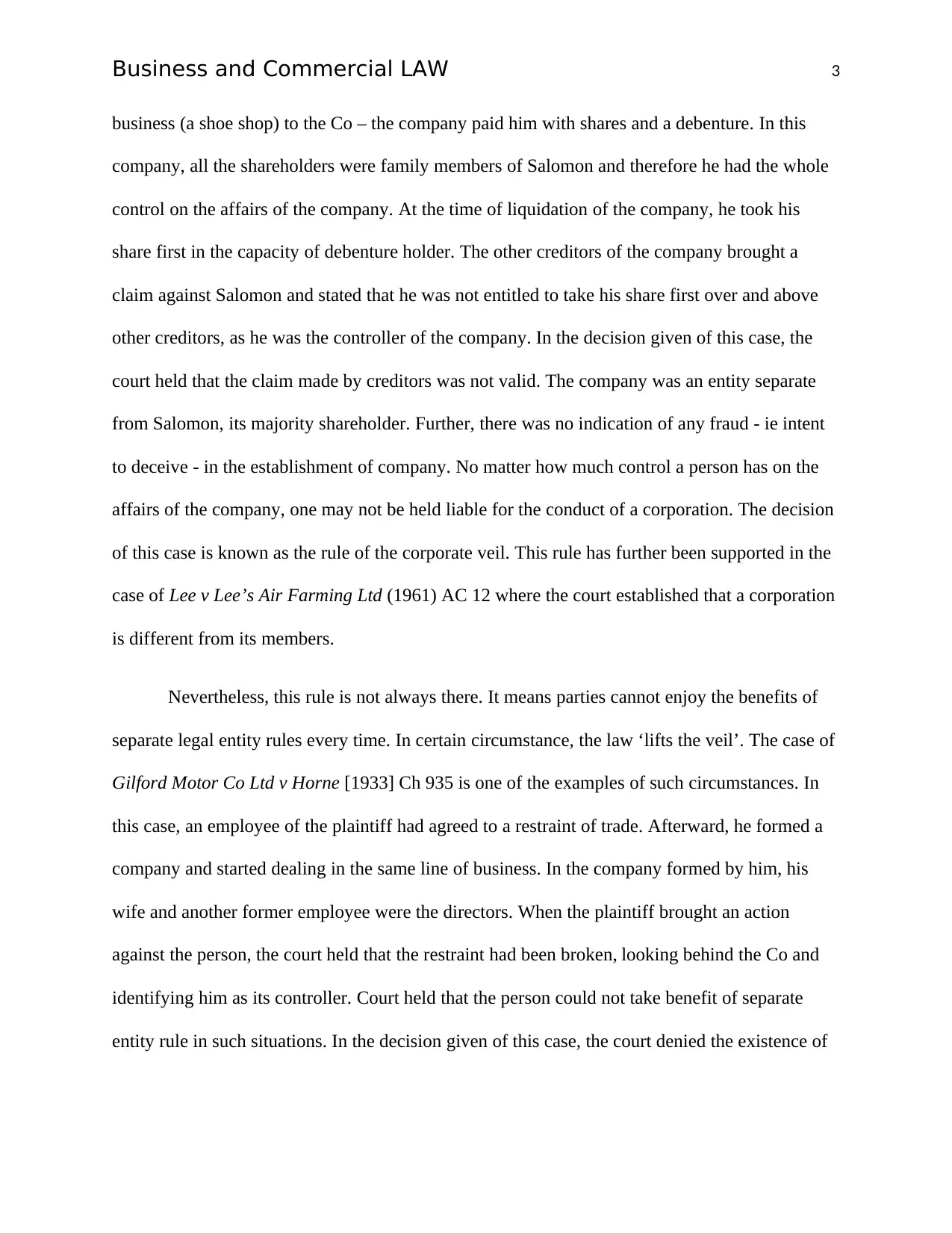
Business and Commercial LAW 3
business (a shoe shop) to the Co – the company paid him with shares and a debenture. In this
company, all the shareholders were family members of Salomon and therefore he had the whole
control on the affairs of the company. At the time of liquidation of the company, he took his
share first in the capacity of debenture holder. The other creditors of the company brought a
claim against Salomon and stated that he was not entitled to take his share first over and above
other creditors, as he was the controller of the company. In the decision given of this case, the
court held that the claim made by creditors was not valid. The company was an entity separate
from Salomon, its majority shareholder. Further, there was no indication of any fraud - ie intent
to deceive - in the establishment of company. No matter how much control a person has on the
affairs of the company, one may not be held liable for the conduct of a corporation. The decision
of this case is known as the rule of the corporate veil. This rule has further been supported in the
case of Lee v Lee’s Air Farming Ltd (1961) AC 12 where the court established that a corporation
is different from its members.
Nevertheless, this rule is not always there. It means parties cannot enjoy the benefits of
separate legal entity rules every time. In certain circumstance, the law ‘lifts the veil’. The case of
Gilford Motor Co Ltd v Horne [1933] Ch 935 is one of the examples of such circumstances. In
this case, an employee of the plaintiff had agreed to a restraint of trade. Afterward, he formed a
company and started dealing in the same line of business. In the company formed by him, his
wife and another former employee were the directors. When the plaintiff brought an action
against the person, the court held that the restraint had been broken, looking behind the Co and
identifying him as its controller. Court held that the person could not take benefit of separate
entity rule in such situations. In the decision given of this case, the court denied the existence of
business (a shoe shop) to the Co – the company paid him with shares and a debenture. In this
company, all the shareholders were family members of Salomon and therefore he had the whole
control on the affairs of the company. At the time of liquidation of the company, he took his
share first in the capacity of debenture holder. The other creditors of the company brought a
claim against Salomon and stated that he was not entitled to take his share first over and above
other creditors, as he was the controller of the company. In the decision given of this case, the
court held that the claim made by creditors was not valid. The company was an entity separate
from Salomon, its majority shareholder. Further, there was no indication of any fraud - ie intent
to deceive - in the establishment of company. No matter how much control a person has on the
affairs of the company, one may not be held liable for the conduct of a corporation. The decision
of this case is known as the rule of the corporate veil. This rule has further been supported in the
case of Lee v Lee’s Air Farming Ltd (1961) AC 12 where the court established that a corporation
is different from its members.
Nevertheless, this rule is not always there. It means parties cannot enjoy the benefits of
separate legal entity rules every time. In certain circumstance, the law ‘lifts the veil’. The case of
Gilford Motor Co Ltd v Horne [1933] Ch 935 is one of the examples of such circumstances. In
this case, an employee of the plaintiff had agreed to a restraint of trade. Afterward, he formed a
company and started dealing in the same line of business. In the company formed by him, his
wife and another former employee were the directors. When the plaintiff brought an action
against the person, the court held that the restraint had been broken, looking behind the Co and
identifying him as its controller. Court held that the person could not take benefit of separate
entity rule in such situations. In the decision given of this case, the court denied the existence of
Paraphrase This Document
Need a fresh take? Get an instant paraphrase of this document with our AI Paraphraser
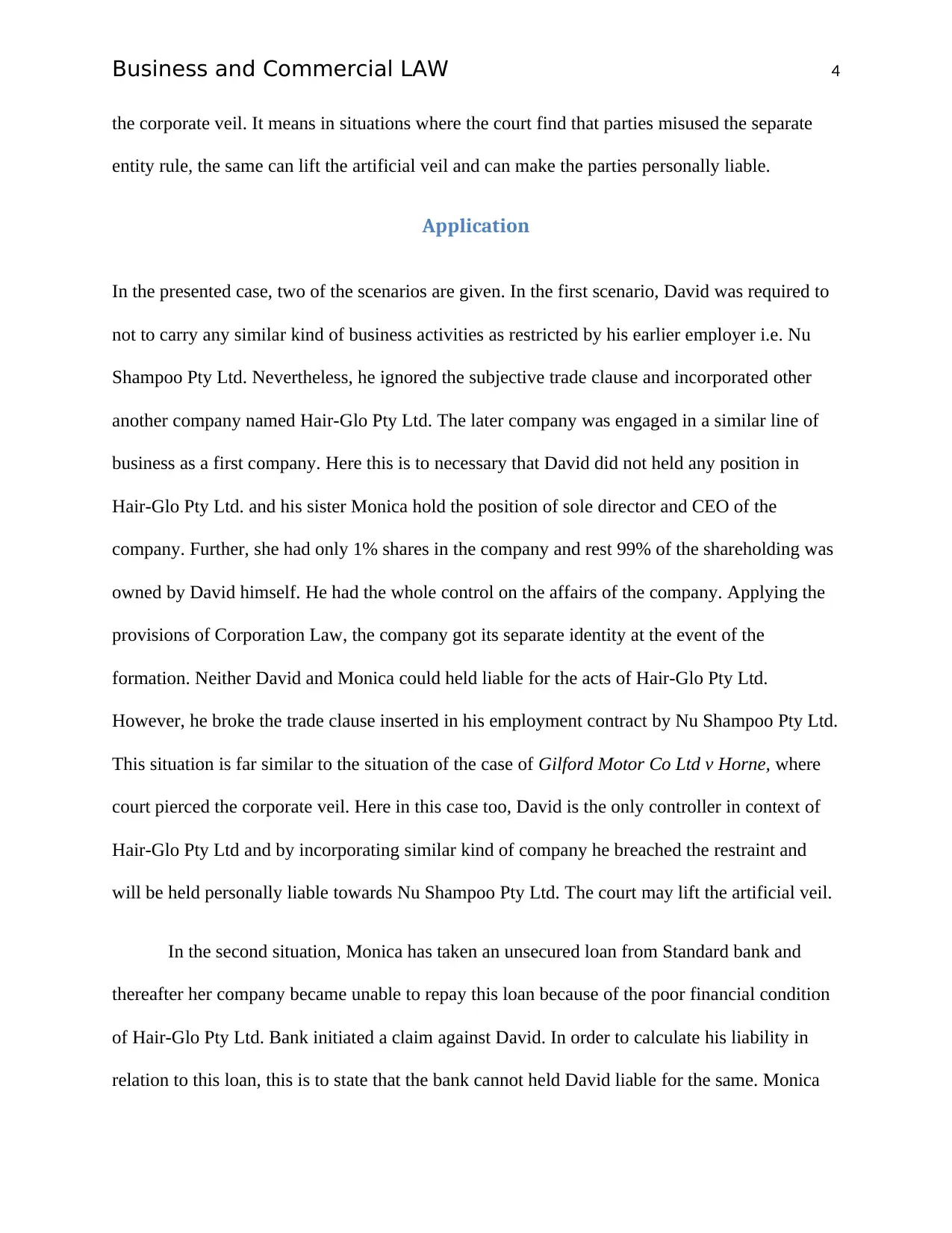
Business and Commercial LAW 4
the corporate veil. It means in situations where the court find that parties misused the separate
entity rule, the same can lift the artificial veil and can make the parties personally liable.
Application
In the presented case, two of the scenarios are given. In the first scenario, David was required to
not to carry any similar kind of business activities as restricted by his earlier employer i.e. Nu
Shampoo Pty Ltd. Nevertheless, he ignored the subjective trade clause and incorporated other
another company named Hair-Glo Pty Ltd. The later company was engaged in a similar line of
business as a first company. Here this is to necessary that David did not held any position in
Hair-Glo Pty Ltd. and his sister Monica hold the position of sole director and CEO of the
company. Further, she had only 1% shares in the company and rest 99% of the shareholding was
owned by David himself. He had the whole control on the affairs of the company. Applying the
provisions of Corporation Law, the company got its separate identity at the event of the
formation. Neither David and Monica could held liable for the acts of Hair-Glo Pty Ltd.
However, he broke the trade clause inserted in his employment contract by Nu Shampoo Pty Ltd.
This situation is far similar to the situation of the case of Gilford Motor Co Ltd v Horne, where
court pierced the corporate veil. Here in this case too, David is the only controller in context of
Hair-Glo Pty Ltd and by incorporating similar kind of company he breached the restraint and
will be held personally liable towards Nu Shampoo Pty Ltd. The court may lift the artificial veil.
In the second situation, Monica has taken an unsecured loan from Standard bank and
thereafter her company became unable to repay this loan because of the poor financial condition
of Hair-Glo Pty Ltd. Bank initiated a claim against David. In order to calculate his liability in
relation to this loan, this is to state that the bank cannot held David liable for the same. Monica
the corporate veil. It means in situations where the court find that parties misused the separate
entity rule, the same can lift the artificial veil and can make the parties personally liable.
Application
In the presented case, two of the scenarios are given. In the first scenario, David was required to
not to carry any similar kind of business activities as restricted by his earlier employer i.e. Nu
Shampoo Pty Ltd. Nevertheless, he ignored the subjective trade clause and incorporated other
another company named Hair-Glo Pty Ltd. The later company was engaged in a similar line of
business as a first company. Here this is to necessary that David did not held any position in
Hair-Glo Pty Ltd. and his sister Monica hold the position of sole director and CEO of the
company. Further, she had only 1% shares in the company and rest 99% of the shareholding was
owned by David himself. He had the whole control on the affairs of the company. Applying the
provisions of Corporation Law, the company got its separate identity at the event of the
formation. Neither David and Monica could held liable for the acts of Hair-Glo Pty Ltd.
However, he broke the trade clause inserted in his employment contract by Nu Shampoo Pty Ltd.
This situation is far similar to the situation of the case of Gilford Motor Co Ltd v Horne, where
court pierced the corporate veil. Here in this case too, David is the only controller in context of
Hair-Glo Pty Ltd and by incorporating similar kind of company he breached the restraint and
will be held personally liable towards Nu Shampoo Pty Ltd. The court may lift the artificial veil.
In the second situation, Monica has taken an unsecured loan from Standard bank and
thereafter her company became unable to repay this loan because of the poor financial condition
of Hair-Glo Pty Ltd. Bank initiated a claim against David. In order to calculate his liability in
relation to this loan, this is to state that the bank cannot held David liable for the same. Monica
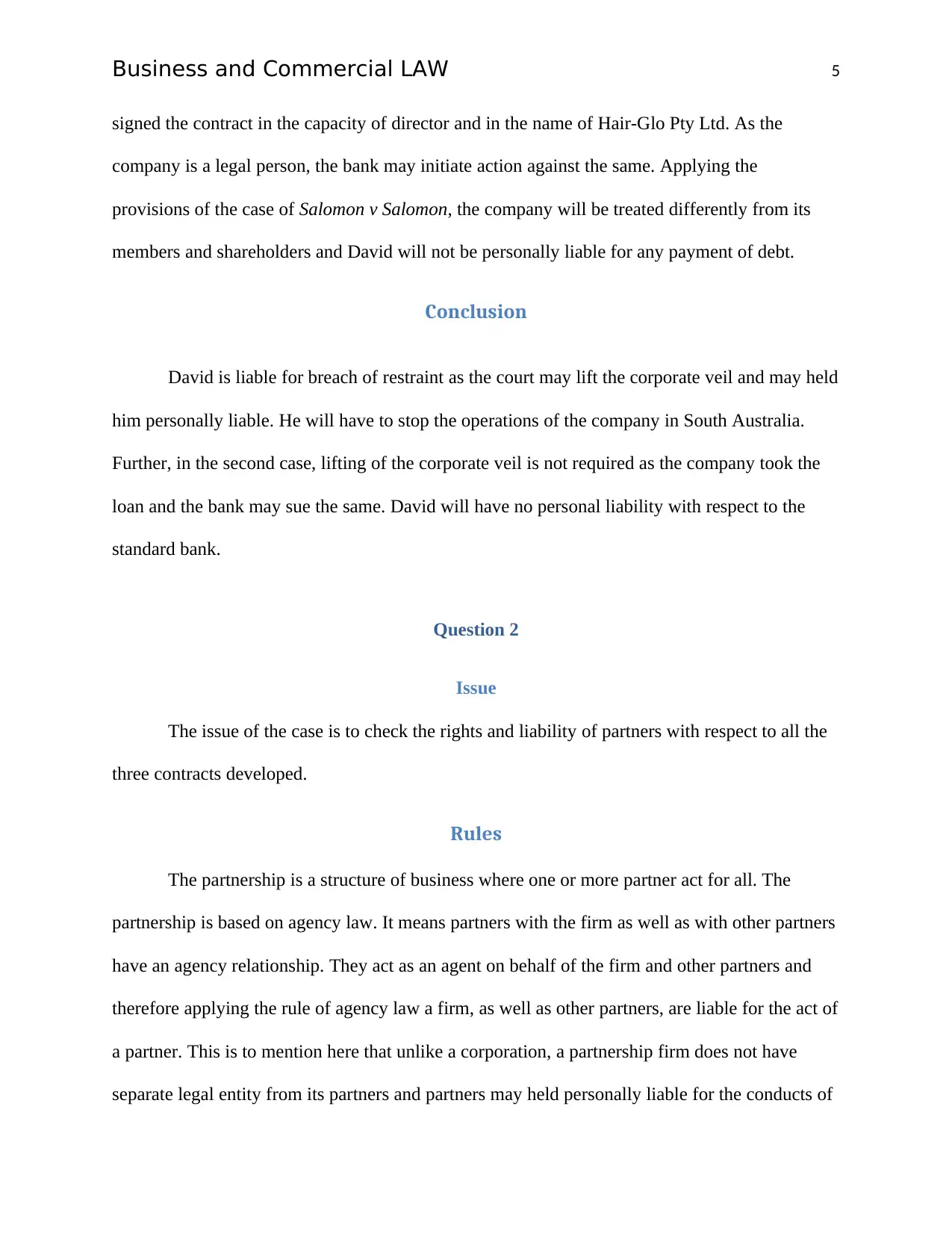
Business and Commercial LAW 5
signed the contract in the capacity of director and in the name of Hair-Glo Pty Ltd. As the
company is a legal person, the bank may initiate action against the same. Applying the
provisions of the case of Salomon v Salomon, the company will be treated differently from its
members and shareholders and David will not be personally liable for any payment of debt.
Conclusion
David is liable for breach of restraint as the court may lift the corporate veil and may held
him personally liable. He will have to stop the operations of the company in South Australia.
Further, in the second case, lifting of the corporate veil is not required as the company took the
loan and the bank may sue the same. David will have no personal liability with respect to the
standard bank.
Question 2
Issue
The issue of the case is to check the rights and liability of partners with respect to all the
three contracts developed.
Rules
The partnership is a structure of business where one or more partner act for all. The
partnership is based on agency law. It means partners with the firm as well as with other partners
have an agency relationship. They act as an agent on behalf of the firm and other partners and
therefore applying the rule of agency law a firm, as well as other partners, are liable for the act of
a partner. This is to mention here that unlike a corporation, a partnership firm does not have
separate legal entity from its partners and partners may held personally liable for the conducts of
signed the contract in the capacity of director and in the name of Hair-Glo Pty Ltd. As the
company is a legal person, the bank may initiate action against the same. Applying the
provisions of the case of Salomon v Salomon, the company will be treated differently from its
members and shareholders and David will not be personally liable for any payment of debt.
Conclusion
David is liable for breach of restraint as the court may lift the corporate veil and may held
him personally liable. He will have to stop the operations of the company in South Australia.
Further, in the second case, lifting of the corporate veil is not required as the company took the
loan and the bank may sue the same. David will have no personal liability with respect to the
standard bank.
Question 2
Issue
The issue of the case is to check the rights and liability of partners with respect to all the
three contracts developed.
Rules
The partnership is a structure of business where one or more partner act for all. The
partnership is based on agency law. It means partners with the firm as well as with other partners
have an agency relationship. They act as an agent on behalf of the firm and other partners and
therefore applying the rule of agency law a firm, as well as other partners, are liable for the act of
a partner. This is to mention here that unlike a corporation, a partnership firm does not have
separate legal entity from its partners and partners may held personally liable for the conducts of
⊘ This is a preview!⊘
Do you want full access?
Subscribe today to unlock all pages.

Trusted by 1+ million students worldwide
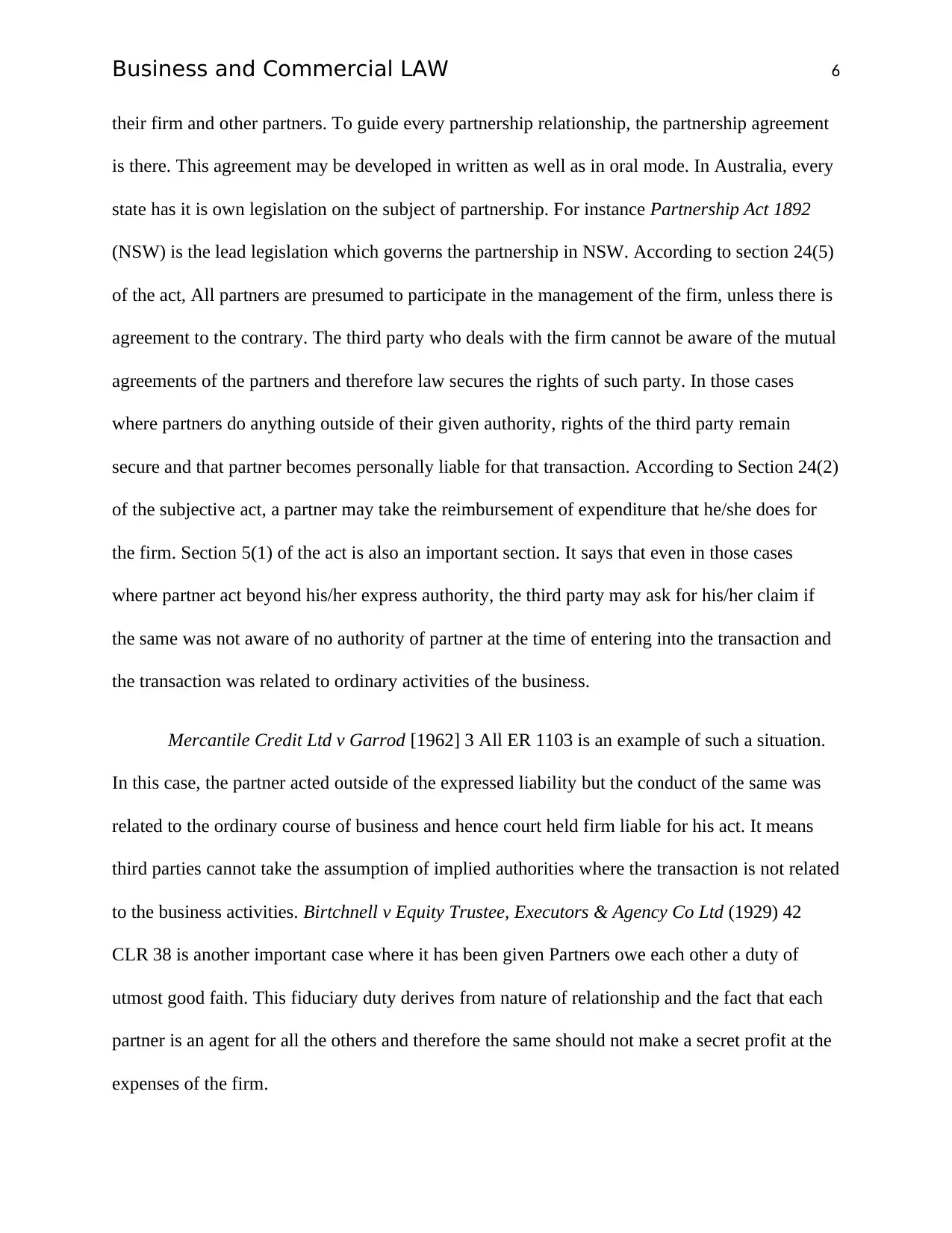
Business and Commercial LAW 6
their firm and other partners. To guide every partnership relationship, the partnership agreement
is there. This agreement may be developed in written as well as in oral mode. In Australia, every
state has it is own legislation on the subject of partnership. For instance Partnership Act 1892
(NSW) is the lead legislation which governs the partnership in NSW. According to section 24(5)
of the act, All partners are presumed to participate in the management of the firm, unless there is
agreement to the contrary. The third party who deals with the firm cannot be aware of the mutual
agreements of the partners and therefore law secures the rights of such party. In those cases
where partners do anything outside of their given authority, rights of the third party remain
secure and that partner becomes personally liable for that transaction. According to Section 24(2)
of the subjective act, a partner may take the reimbursement of expenditure that he/she does for
the firm. Section 5(1) of the act is also an important section. It says that even in those cases
where partner act beyond his/her express authority, the third party may ask for his/her claim if
the same was not aware of no authority of partner at the time of entering into the transaction and
the transaction was related to ordinary activities of the business.
Mercantile Credit Ltd v Garrod [1962] 3 All ER 1103 is an example of such a situation.
In this case, the partner acted outside of the expressed liability but the conduct of the same was
related to the ordinary course of business and hence court held firm liable for his act. It means
third parties cannot take the assumption of implied authorities where the transaction is not related
to the business activities. Birtchnell v Equity Trustee, Executors & Agency Co Ltd (1929) 42
CLR 38 is another important case where it has been given Partners owe each other a duty of
utmost good faith. This fiduciary duty derives from nature of relationship and the fact that each
partner is an agent for all the others and therefore the same should not make a secret profit at the
expenses of the firm.
their firm and other partners. To guide every partnership relationship, the partnership agreement
is there. This agreement may be developed in written as well as in oral mode. In Australia, every
state has it is own legislation on the subject of partnership. For instance Partnership Act 1892
(NSW) is the lead legislation which governs the partnership in NSW. According to section 24(5)
of the act, All partners are presumed to participate in the management of the firm, unless there is
agreement to the contrary. The third party who deals with the firm cannot be aware of the mutual
agreements of the partners and therefore law secures the rights of such party. In those cases
where partners do anything outside of their given authority, rights of the third party remain
secure and that partner becomes personally liable for that transaction. According to Section 24(2)
of the subjective act, a partner may take the reimbursement of expenditure that he/she does for
the firm. Section 5(1) of the act is also an important section. It says that even in those cases
where partner act beyond his/her express authority, the third party may ask for his/her claim if
the same was not aware of no authority of partner at the time of entering into the transaction and
the transaction was related to ordinary activities of the business.
Mercantile Credit Ltd v Garrod [1962] 3 All ER 1103 is an example of such a situation.
In this case, the partner acted outside of the expressed liability but the conduct of the same was
related to the ordinary course of business and hence court held firm liable for his act. It means
third parties cannot take the assumption of implied authorities where the transaction is not related
to the business activities. Birtchnell v Equity Trustee, Executors & Agency Co Ltd (1929) 42
CLR 38 is another important case where it has been given Partners owe each other a duty of
utmost good faith. This fiduciary duty derives from nature of relationship and the fact that each
partner is an agent for all the others and therefore the same should not make a secret profit at the
expenses of the firm.
Paraphrase This Document
Need a fresh take? Get an instant paraphrase of this document with our AI Paraphraser
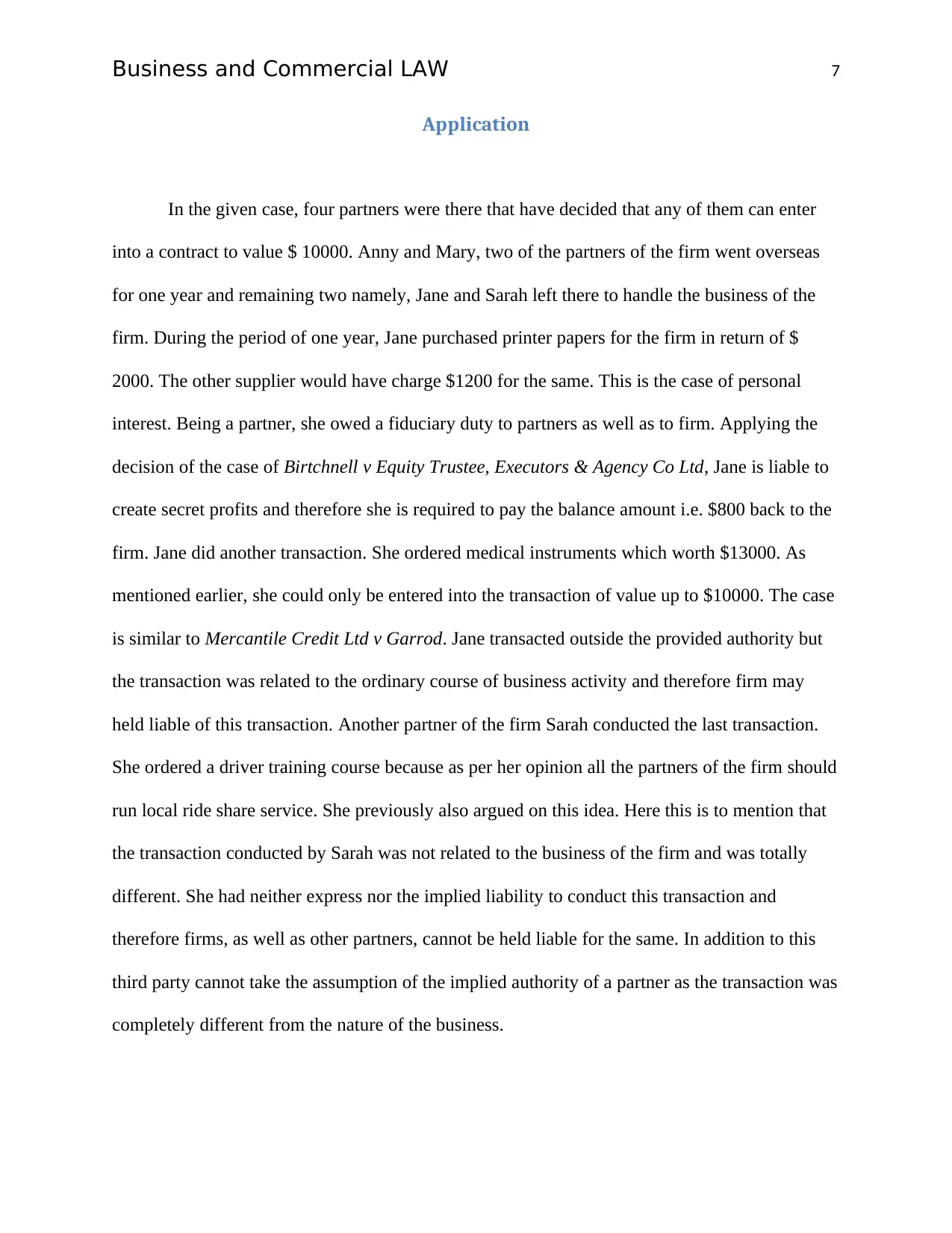
Business and Commercial LAW 7
Application
In the given case, four partners were there that have decided that any of them can enter
into a contract to value $ 10000. Anny and Mary, two of the partners of the firm went overseas
for one year and remaining two namely, Jane and Sarah left there to handle the business of the
firm. During the period of one year, Jane purchased printer papers for the firm in return of $
2000. The other supplier would have charge $1200 for the same. This is the case of personal
interest. Being a partner, she owed a fiduciary duty to partners as well as to firm. Applying the
decision of the case of Birtchnell v Equity Trustee, Executors & Agency Co Ltd, Jane is liable to
create secret profits and therefore she is required to pay the balance amount i.e. $800 back to the
firm. Jane did another transaction. She ordered medical instruments which worth $13000. As
mentioned earlier, she could only be entered into the transaction of value up to $10000. The case
is similar to Mercantile Credit Ltd v Garrod. Jane transacted outside the provided authority but
the transaction was related to the ordinary course of business activity and therefore firm may
held liable of this transaction. Another partner of the firm Sarah conducted the last transaction.
She ordered a driver training course because as per her opinion all the partners of the firm should
run local ride share service. She previously also argued on this idea. Here this is to mention that
the transaction conducted by Sarah was not related to the business of the firm and was totally
different. She had neither express nor the implied liability to conduct this transaction and
therefore firms, as well as other partners, cannot be held liable for the same. In addition to this
third party cannot take the assumption of the implied authority of a partner as the transaction was
completely different from the nature of the business.
Application
In the given case, four partners were there that have decided that any of them can enter
into a contract to value $ 10000. Anny and Mary, two of the partners of the firm went overseas
for one year and remaining two namely, Jane and Sarah left there to handle the business of the
firm. During the period of one year, Jane purchased printer papers for the firm in return of $
2000. The other supplier would have charge $1200 for the same. This is the case of personal
interest. Being a partner, she owed a fiduciary duty to partners as well as to firm. Applying the
decision of the case of Birtchnell v Equity Trustee, Executors & Agency Co Ltd, Jane is liable to
create secret profits and therefore she is required to pay the balance amount i.e. $800 back to the
firm. Jane did another transaction. She ordered medical instruments which worth $13000. As
mentioned earlier, she could only be entered into the transaction of value up to $10000. The case
is similar to Mercantile Credit Ltd v Garrod. Jane transacted outside the provided authority but
the transaction was related to the ordinary course of business activity and therefore firm may
held liable of this transaction. Another partner of the firm Sarah conducted the last transaction.
She ordered a driver training course because as per her opinion all the partners of the firm should
run local ride share service. She previously also argued on this idea. Here this is to mention that
the transaction conducted by Sarah was not related to the business of the firm and was totally
different. She had neither express nor the implied liability to conduct this transaction and
therefore firms, as well as other partners, cannot be held liable for the same. In addition to this
third party cannot take the assumption of the implied authority of a partner as the transaction was
completely different from the nature of the business.
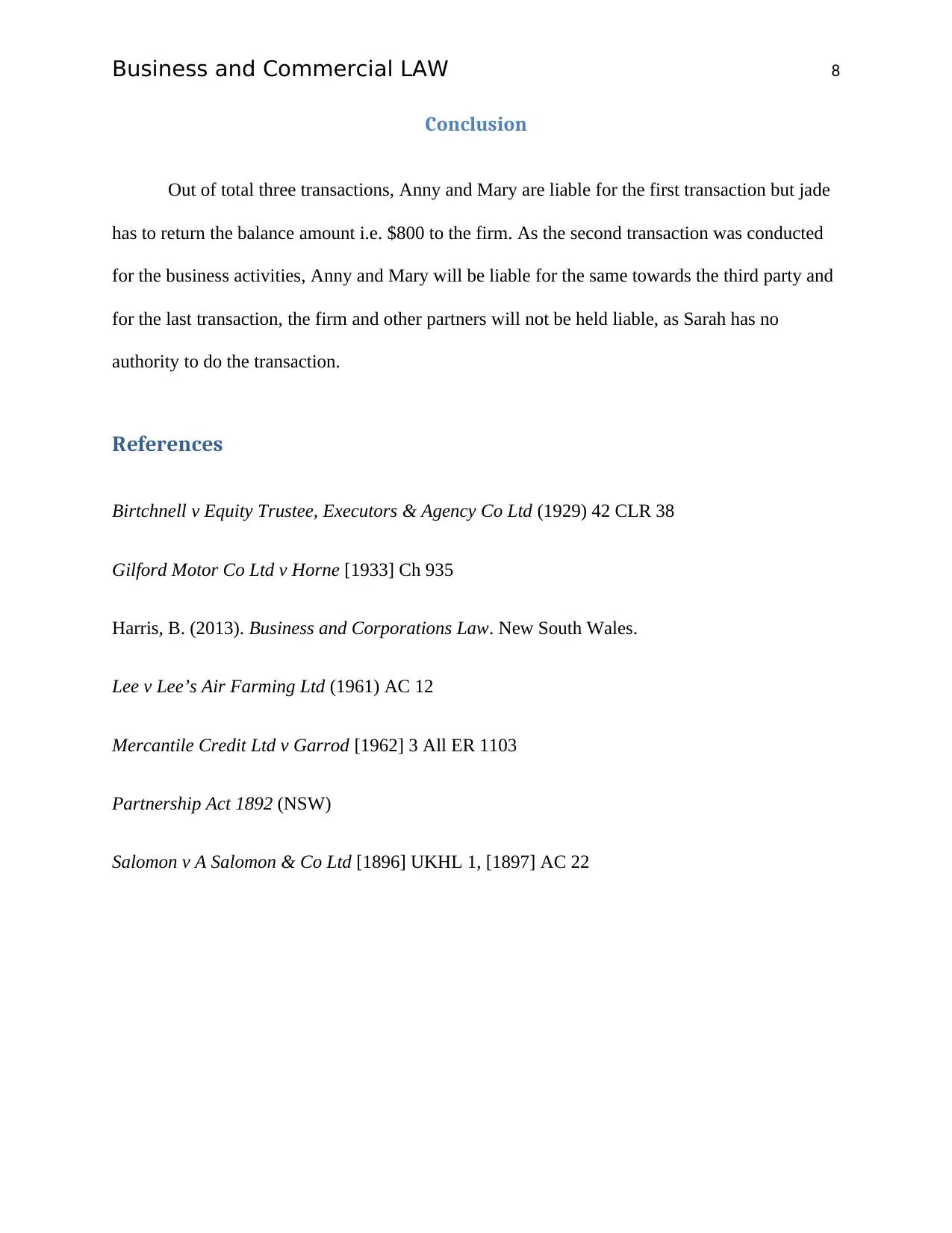
Business and Commercial LAW 8
Conclusion
Out of total three transactions, Anny and Mary are liable for the first transaction but jade
has to return the balance amount i.e. $800 to the firm. As the second transaction was conducted
for the business activities, Anny and Mary will be liable for the same towards the third party and
for the last transaction, the firm and other partners will not be held liable, as Sarah has no
authority to do the transaction.
References
Birtchnell v Equity Trustee, Executors & Agency Co Ltd (1929) 42 CLR 38
Gilford Motor Co Ltd v Horne [1933] Ch 935
Harris, B. (2013). Business and Corporations Law. New South Wales.
Lee v Lee’s Air Farming Ltd (1961) AC 12
Mercantile Credit Ltd v Garrod [1962] 3 All ER 1103
Partnership Act 1892 (NSW)
Salomon v A Salomon & Co Ltd [1896] UKHL 1, [1897] AC 22
Conclusion
Out of total three transactions, Anny and Mary are liable for the first transaction but jade
has to return the balance amount i.e. $800 to the firm. As the second transaction was conducted
for the business activities, Anny and Mary will be liable for the same towards the third party and
for the last transaction, the firm and other partners will not be held liable, as Sarah has no
authority to do the transaction.
References
Birtchnell v Equity Trustee, Executors & Agency Co Ltd (1929) 42 CLR 38
Gilford Motor Co Ltd v Horne [1933] Ch 935
Harris, B. (2013). Business and Corporations Law. New South Wales.
Lee v Lee’s Air Farming Ltd (1961) AC 12
Mercantile Credit Ltd v Garrod [1962] 3 All ER 1103
Partnership Act 1892 (NSW)
Salomon v A Salomon & Co Ltd [1896] UKHL 1, [1897] AC 22
⊘ This is a preview!⊘
Do you want full access?
Subscribe today to unlock all pages.

Trusted by 1+ million students worldwide
1 out of 9
Related Documents
Your All-in-One AI-Powered Toolkit for Academic Success.
+13062052269
info@desklib.com
Available 24*7 on WhatsApp / Email
![[object Object]](/_next/static/media/star-bottom.7253800d.svg)
Unlock your academic potential
Copyright © 2020–2025 A2Z Services. All Rights Reserved. Developed and managed by ZUCOL.





